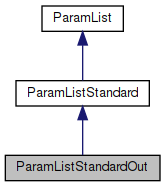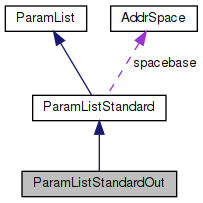A standard model for passing back return values from a function. More...
#include <fspec.hh>


Public Member Functions | |
| ParamListStandardOut (void) | |
| Constructor. | |
| ParamListStandardOut (const ParamListStandardOut &op2) | |
| Copy constructor. | |
| virtual uint4 | getType (void) const |
| Get the type of parameter list. | |
| virtual void | assignMap (const vector< Datatype *> &proto, bool isinput, TypeFactory &typefactory, vector< ParameterPieces > &res) const |
| Given list of data-types, map the list positions to storage locations. More... | |
| virtual void | fillinMap (ParamActive *active) const |
| Given an unordered list of storage locations, calculate a function prototype. More... | |
| virtual bool | possibleParam (const Address &loc, int4 size) const |
| Does the given storage location make sense as a parameter. More... | |
| virtual void | restoreXml (const Element *el, const AddrSpaceManager *manage, vector< EffectRecord > &effectlist, bool normalstack) |
| Restore the model from an XML stream. More... | |
| virtual ParamList * | clone (void) const |
| Clone this parameter list model. | |
 Public Member Functions inherited from ParamListStandard Public Member Functions inherited from ParamListStandard | |
| ParamListStandard (void) | |
| Construct for use with restoreXml() | |
| ParamListStandard (const ParamListStandard &op2) | |
| Copy constructor. | |
| const list< ParamEntry > & | getEntry (void) const |
| Get the list of parameter entries. | |
| virtual bool | checkJoin (const Address &hiaddr, int4 hisize, const Address &loaddr, int4 losize) const |
| Check if the given two storage locations can represent a single logical parameter. More... | |
| virtual bool | checkSplit (const Address &loc, int4 size, int4 splitpoint) const |
| Check if it makes sense to split a single storage location into two parameters. More... | |
| virtual int4 | characterizeAsParam (const Address &loc, int4 size) const |
| Characterize whether the given range overlaps parameter storage. More... | |
| virtual bool | possibleParamWithSlot (const Address &loc, int4 size, int4 &slot, int4 &slotsize) const |
| Pass-back the slot and slot size for the given storage location as a parameter. More... | |
| virtual bool | getBiggestContainedParam (const Address &loc, int4 size, VarnodeData &res) const |
| Pass-back the biggest parameter contained within the given range. More... | |
| virtual bool | unjustifiedContainer (const Address &loc, int4 size, VarnodeData &res) const |
| Check if the given storage location looks like an unjustified parameter. More... | |
| virtual OpCode | assumedExtension (const Address &addr, int4 size, VarnodeData &res) const |
| Get the type of extension and containing parameter for the given storage. More... | |
| virtual AddrSpace * | getSpacebase (void) const |
| Get the address space associated with any stack based parameters in this list. More... | |
| virtual void | getRangeList (AddrSpace *spc, RangeList &res) const |
| For a given address space, collect all the parameter locations within that space. More... | |
| virtual int4 | getMaxDelay (void) const |
| Return the maximum heritage delay across all possible parameters. More... | |
 Public Member Functions inherited from ParamList Public Member Functions inherited from ParamList | |
| virtual | ~ParamList (void) |
| Destructor. | |
Additional Inherited Members | |
 Public Types inherited from ParamList Public Types inherited from ParamList | |
| enum | { p_standard, p_standard_out, p_register, p_merged } |
 Protected Member Functions inherited from ParamListStandard Protected Member Functions inherited from ParamListStandard | |
| const ParamEntry * | findEntry (const Address &loc, int4 size) const |
| Given storage location find matching ParamEntry. More... | |
| Address | assignAddress (const Datatype *tp, vector< int4 > &status) const |
| Assign storage for given parameter data-type. More... | |
| void | buildTrialMap (ParamActive *active) const |
| Build map from parameter trials to model ParamEntrys. More... | |
| void | separateFloat (ParamActive *active, int4 &floatstart, int4 &floatstop, int4 &start, int4 &stop) const |
| Calculate the range of floating-point entries within a given set of parameter trials. More... | |
| void | forceExclusionGroup (ParamActive *active) const |
| Enforce exclusion rules for the given set of parameter trials. More... | |
| void | forceNoUse (ParamActive *active, int4 start, int4 stop) const |
| Mark every trial above the first "definitely not used" as inactive. More... | |
| void | forceInactiveChain (ParamActive *active, int4 maxchain, int4 start, int4 stop) const |
| Enforce rules about chains of inactive slots. More... | |
| void | calcDelay (void) |
| Calculate the maximum heritage delay for any potential parameter in this list. | |
| void | populateResolver (void) |
| Build the ParamEntry resolver maps. More... | |
 Protected Attributes inherited from ParamListStandard Protected Attributes inherited from ParamListStandard | |
| int4 | numgroup |
| Number of groups in this parameter convention. | |
| int4 | maxdelay |
| Maximum heritage delay across all parameters. | |
| int4 | pointermax |
| If non-zero, maximum size of a data-type before converting to a pointer. | |
| bool | thisbeforeret |
| Does a this parameter come before a hidden return parameter. | |
| int4 | nonfloatgroup |
| Group of first entry which is not marked float. | |
| list< ParamEntry > | entry |
| The ordered list of parameter entries. | |
| vector< ParamEntryResolver * > | resolverMap |
| Map from space id to resolver. | |
| AddrSpace * | spacebase |
| Address space containing relative offset parameters. | |
Detailed Description
A standard model for passing back return values from a function.
This models a resource list of potential storage locations for a return value, at most 1 of which will be chosen for a given function. Order only matters in that the first ParamEntry that fits is used. If no entry fits, the return value is converted to a pointer data-type, storage allocation is attempted again, and the return value is marked as a hidden return parameter to inform the input model.
Member Function Documentation
◆ assignMap()
|
virtual |
Given list of data-types, map the list positions to storage locations.
If we know the function prototype, recover how parameters are actually stored using the model.
- Parameters
-
proto is the ordered list of data-types isinput is true for the input prototype, false for output prototype typefactory is the TypeFactory (for constructing pointers) res will contain the storage locations corresponding to the datatypes
Reimplemented from ParamListStandard.
◆ fillinMap()
|
virtual |
Given an unordered list of storage locations, calculate a function prototype.
A list of input (or output) trials is given, which may have holes, invalid inputs etc. Decide on the formal ordered parameter list. Trials within the ParamActive are added, removed, or reordered as needed.
- Parameters
-
active is the given list of trials
Reimplemented from ParamListStandard.
◆ possibleParam()
|
virtual |
Does the given storage location make sense as a parameter.
Within this model, decide if the storage location can be considered a parameter.
- Parameters
-
loc is the starting address of the storage location size is the number of bytes in the storage location
- Returns
- true if the location can be a parameter
Reimplemented from ParamListStandard.
◆ restoreXml()
|
virtual |
Restore the model from an XML stream.
- Parameters
-
el is the root <input> or <output> element manage is used to resolve references to address spaces effectlist is a container collecting EffectRecords across all parameters normalstack is true if parameters are pushed on the stack in the normal order
Reimplemented from ParamListStandard.
The documentation for this class was generated from the following files:
- fspec.hh
- fspec.cc
 1.8.13
1.8.13